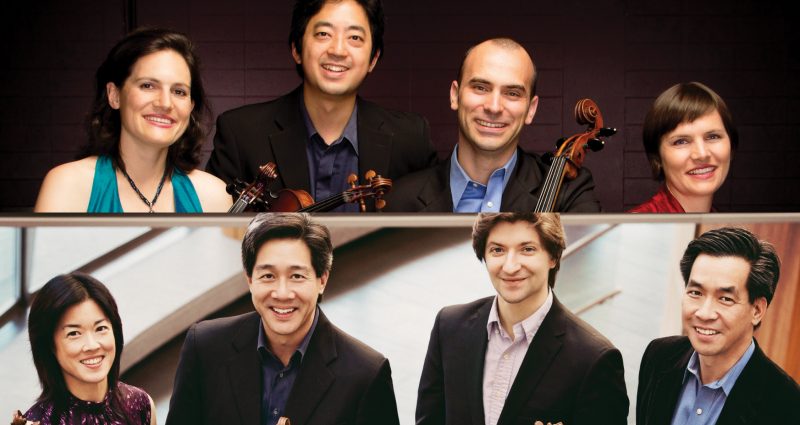- This event has passed.
The Jupiter and Ying Quartets reunite for a joint program!
This concert is sold out. Please call 207-373-1400 to be placed on a waiting list.
JUPITER QUARTET
Nelson Lee, Meg Freivogel, violin • Liz Freivogel, viola • Daniel McDonough, cello
YING QUARTET
Robin Scott, Janet Ying, violin • Phillip Ying, viola • David Ying, cello
ANTON ARENSKY
String Quartet No. 2 in A Minor, Op. 35
Meg Freivogel, violin • Liz Freivogel, viola • Daniel McDonough, David Ying, cello
— Intermission —
FRANZ SCHUBERT
String Quintet in C Major, Op. 163, D. 956
Robin Scott, Janet Ying, violin • Phillip Ying, viola • David Ying, Daniel McDonough, cello
PROGRAM NOTES
ANTON ARENSKY
String Quartet No. 2 in A Minor, Op. 35 (1894)
Arensky dedicated his second string quartet to the memory of Tchaikovsky, who had died in 1893, the year before the quartet was composed. The elder composer had been a mentor to Arensky since the latter moved to Moscow in 1882 to take up a professorship in harmony and counterpoint at the Moscow Conservatory.
To construct a musical memorial befitting Tchaikovsky’s stature, Arensky wove a tapestry of carefully chosen themes, each helpfully identified in the table of contents accompanying the published score. The first movement opens with a chant-like orthodox psalm: the instrumentation for two cellos, unconventional in the context of a string quartet, deepens the low register as if to emulate the rich bass texture of a Russian Orthodox choir, setting a reflective tone for the work. The second movement is a spirited set of variations on a theme drawn from Tchaikovsky’s own collection of Children’s Songs. The Finale contains two additional themes: first, a slow opening drawing another chant theme from the Requiem Mass, which then breaks out into a beloved Russian folksong already familiar to chamber musicians as the “Russian theme” in Beethoven’s second “Razumovsky” quartet (Op. 59, No. 2) — a work greatly admired by Tchaikovsky. While the double cellos contribute to the work’s distinct textures and requiescent mood, it also raised marketing concerns for Arensky’s publisher, who insisted that the composer produce an alternate arrangement for the traditional quartet ensemble, to be published separately as “Op. 35a” — recalling the perennial need to reconcile composers’ artistic ambitions with the dynamics of commercial music markets!
FRANZ SCHUBERT
String Quintet in C Major, Op. 163, D. 956 (1828)
Schubert’s string quintet forms part of an effusion of glorious music composed in the year or so before he died — an outpouring which also included Winterreise and Schwanengesang, the Fantasy for violin and piano, the second piano trio, his Symphony No. 9, and the three final piano sonatas. Given the exalted reception this work has received since, it might come as a shock that Schubert’s publisher, Probst, took no interest in the quintet in 1828. Instead, Probst’s counter-request upon receiving the work — that Schubert send him more Lieder — serves not only as a reminder of the commercial realities underpinning composers’ lives for much of the nineteenth century (like Arensky’s publisher’s request), but also of Schubert’s pigeonholed reputation as a songwriter during his lifetime. The quintet lay unperformed until 1850 and unpublished until 1853, decades after the composer’s death.
In contrast to the quintets of Mozart and Beethoven, Schubert supplemented the string quartet formation by adding a second cello in place of a second viola. The result is a symmetrical ensemble, divisible into multiple fluid alliances affording rich textural interplay. Schubert exploits this potential as early as the opening bars: a C Major chord, swelling into and out of a neighboring diminished harmony, is brightened by its presentation in the upper quartet; this statement is then reflected in a minor shade, darkened this time by the lower tessitura of the bottom four strings. In the second subject, Schubert spotlights the twinned cellos in a lyrical duet that winds to the dominant key area by way of the unusual intermediary of E-flat Major. Yet another precious texture opens the second movement: a protracted theme, harmonized and sustained in the three close inner parts, is ornamented by a crystalline dialogue between the second cello’s pizzicato and the dotted figure in the first violin, marked “espressivo.” The serenity in E Major cedes, via an abrupt trill, to a tumultuous middle section in F minor, a dark shift up a semitone that musicologist Scott Burnham describes as “thresholds between, worlds apart.” The third and fourth movements invoke the exuberance of popular and folk styles — careful pacing and mounting tension yield to the acceleration of the final coda.


